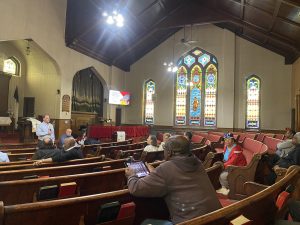Talk of affordability, and why it was included as an action step in Berlin’s draft strategic plan, highlighted a recent input session about the working document.

Residents listen to a BEACON representative discuss the town’s draft strategic plan during a recent input session at St. Paul United Methodist Church.
Charlene Sharpe / Bayside Gazette
By Charlene Sharpe, Associate Editor
Talk of affordability highlighted a recent strategic planning input session in Berlin.
Representatives of Salisbury’s University’s BEACON (Business, Economic and Community Outreach Network) reviewed the latest draft of the town’s comprehensive plan with residents last week at a meeting at St. Paul United Methodist Church. Many of the comments related to affordability and just why it was included as an action step in the strategic plan driving strategy related to retaining a small-town feel.
“Nationwide nobody can define what affordable housing is,” resident Chris Denny said.
BEACON’s John Hickman outlined the draft strategic plan for dozens of residents at the church last Wednesday. The plan’s mission statement talks about how the community envisions a town where heritage, culture, resilience, friendliness and well-being serve as guiding principles fostering a vibrant and inclusive community. There are six driving strategies, with ensuing action steps, that are meant to help the town fulfil its mission. While some strategies focus on fostering a community where all are welcome and improving infrastructure, one that generated significant discussion last week related to retaining a small town feel and providing opportunities for a diverse community to live and thrive in Berlin. The action step of studying affordability generated numerous questions and comments. Denny asked Hickman to define affordable.
“I cannot,” Hickman said. “That’s part of why that action step is in there. That discussion came up in the broader discussions with this which led to this being an action step and looking at all of the aspects around affordability.”
Councilman Steve Green said affordability was hard to define because it was house by house and sometimes year by year.
“I look forward to exploring that,” he said.
Denny said it was a question nobody seemed to answer. Another resident in the crowd said she thought affordability meant that people who were from a community—not just those who came to the area from big cities–should be able to buy houses there.
“That’s what we need to figure out,” she said. “How do you make it so the people that actually live in the area can afford a house they can actually keep and maintain.”
Others said there was a need for senior housing. Some said young adults couldn’t afford to return to the area after they attended college. Resident Gabe Purnell said there was also a need for affordable housing for those who were single and living on only their own income. He said Diakonia, the local shelter, was overrun.
“They can’t expand, county government said no,” Purnell said. “It’ll be a few years before they’ll be able to expand so we’re really in a crisis.”
Mayor Zack Tyndall said that while affordability was complicated to define, the conversation showed that there were a variety of different factors that played into it. While age and income level play a part, he said impacts of everything from zoning to internet speed could also effect affordability and opportunities for local residents.
“I think there’s a lot of things that go into this but first and foremost we’ve got to put it front and center and say it’s a challenge, lets figure it out,” Tyndall said. “I think it’s going to take a lot of these different meetings and conversations about how we get there. It should be front and center.”
